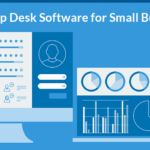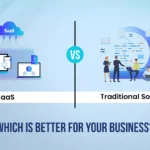In today’s fast-paced digital world, choosing the right software solution is crucial for business success. Companies often find themselves at a crossroads when deciding between custom software and off-the-shelf solutions. Both options have their advantages and disadvantages, and the right choice depends on various factors, including your business needs, budget, and future scalability. Let’s dive into the details of both approaches, helping you make an informed decision that aligns with your organizational goals.

What Is Custom Software?
Custom software is tailored specifically to meet the unique requirements of a business. Developed from scratch, this solution is designed to align perfectly with the company’s workflows, processes, and overall objectives. It can be built by an in-house team or outsourced to software development companies.
Advantages of Custom Software
- Tailored Solutions: Custom software is designed to meet your specific business needs, ensuring that every feature and function is relevant and useful. This personalization can lead to improved productivity and efficiency.
- Scalability: As your business grows, your software can evolve with it. Custom solutions are built with scalability in mind, allowing you to add new features and capabilities as needed.
- Competitive Advantage: Having a unique software solution can provide a competitive edge. Custom software can incorporate features that differentiate your business from competitors, potentially improving market position.
- Integration Capabilities: Custom software can be designed to seamlessly integrate with your existing systems and software, facilitating better data flow and reducing manual processes.
- Ownership and Control: With custom software, you have full ownership and control over the codebase. This means you can modify it, enhance it, and maintain it according to your own timeline and priorities.
Disadvantages of Custom Software
- High Initial Costs: Developing custom software typically requires a significant investment, particularly in the early stages. This includes costs for development, testing, and ongoing maintenance.
- Time-Consuming: The development process can be lengthy, especially if the software requires extensive customization or complex features. This means you may not see a return on investment (ROI) as quickly as you would with off-the-shelf solutions.
- Ongoing Maintenance: Custom software requires continuous support and updates, which can lead to additional costs over time. Businesses must allocate resources for maintenance and troubleshooting.
- Dependency on Developers: If you rely on external developers, you may face challenges related to ongoing support, updates, and any necessary modifications down the line.
What Is Off-the-Shelf Software?
Off-the-shelf software refers to pre-packaged solutions that are available for purchase and can be used immediately after installation. These products are designed to serve a broad audience, often addressing common needs across various industries.
Advantages of Off-the-Shelf Software
- Lower Initial Costs: Off-the-shelf software generally has lower upfront costs compared to custom solutions, making it a budget-friendly option for small and medium-sized businesses.
- Quick Implementation: Since the software is ready-made, you can implement it quickly, which means you can start using it and see results faster than with custom solutions.
- Regular Updates and Support: Many vendors offer regular updates and support services as part of the package, ensuring your software stays current and functional.
- Proven Solutions: Off-the-shelf software has often been tested across various environments, providing a level of reliability and performance assurance that custom software may not guarantee.
- Wide Community Support: Popular off-the-shelf solutions often have user communities and forums, providing additional resources for troubleshooting and best practices.
Disadvantages of Off-the-Shelf Software
- Limited Customization: While many off-the-shelf solutions offer some level of customization, they are generally not as flexible as custom software. You may have to adjust your business processes to fit the software rather than the other way around.
- Potential for Unused Features: Many off-the-shelf solutions come with a plethora of features that your business may not need. This can lead to wasted resources on functionalities that don’t add value.
- Integration Challenges: Off-the-shelf software may not integrate seamlessly with your existing systems, requiring additional work or even leading to data silos.
- Vendor Lock-in: Relying on a specific vendor can lead to issues if their software becomes outdated or if their support diminishes. This can limit your options in the future.
- Security Concerns: Since off-the-shelf software is used by many organizations, it can be a target for cyberattacks. This poses a risk, especially if the software handles sensitive data.
Key Factors to Consider
When deciding between custom software and off-the-shelf solutions, consider the following factors:
1. Business Needs and Goals
Evaluate your business’s specific needs. If your processes are unique and require specialized software, custom development might be the best route. Conversely, if your needs are more general, an off-the-shelf solution may suffice.
2. Budget
Analyze your budget. Custom software requires a higher initial investment, while off-the-shelf solutions are usually more affordable upfront. However, consider the long-term costs of maintenance and potential future upgrades.
3. Implementation Timeline
How quickly do you need the solution? Off-the-shelf software can be implemented almost immediately, while custom solutions take time to develop.
4. Scalability and Flexibility
Consider your growth plans. If you anticipate rapid expansion or changing needs, custom software might offer the flexibility and scalability required for your future success.
5. User Experience
Assess how your team will interact with the software. Custom software can be designed with your users in mind, potentially leading to a better overall experience compared to off-the-shelf solutions, which may not address specific user requirements.
Case Studies: Custom vs. Off-the-Shelf
Custom Software Case Study: A Healthcare Provider
A healthcare provider needed a solution to manage patient records, appointments, and billing. Off-the-shelf solutions did not meet their compliance requirements, leading them to develop a custom software solution. This software integrated seamlessly with their existing systems, improving efficiency and patient care while ensuring compliance with healthcare regulations.
Off-the-Shelf Software Case Study: A Small Retail Business
A small retail business required an inventory management system. They chose an off-the-shelf software solution that provided basic inventory tracking and reporting. This choice allowed them to implement the system quickly and at a lower cost, which worked well for their simple inventory needs without requiring extensive customization.
Making the Decision: A Roadmap
- Identify Your Needs: Outline your business objectives and the specific problems you need to solve.
- Budget Planning: Determine your budget and consider both upfront and ongoing costs.
- Research Options: Investigate both custom and off-the-shelf solutions. Read reviews, and consider talking to other businesses that have made similar choices.
- Consult Stakeholders: Involve key stakeholders in the decision-making process to ensure that all perspectives are considered.
- Pilot Testing: If possible, run a pilot test with off-the-shelf software to see if it meets your needs before committing to a purchase.
- Evaluate Long-Term Plans: Consider your future growth and whether the software can evolve with your business.
Conclusion
Choosing between custom software and off-the-shelf solutions is a significant decision that can impact your business’s efficiency, productivity, and bottom line. By weighing the advantages and disadvantages of each option and considering your unique needs, budget, and future goals, you can make a choice that aligns with your business strategy. Whether you opt for the tailored approach of custom software or the quick and cost-effective benefits of off-the-shelf solutions, the right decision can set your business on a path to success.



















